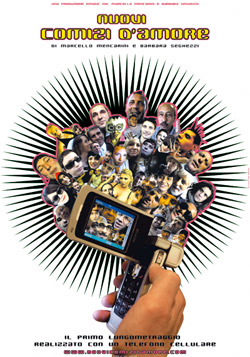 Leafing through my hardcopy of the September/October edition of Filmcomment, published by the Film Society of Lincoln Center, I came across a mini-review of “New Love Meetings,” co-directed by Marcello Mencarini and Barbara Seghezzi. First featured in The Guardian Unlimited, this story was newsworthy because this film is reportedly the first feature (93 minutes) entirely shot with a cell phone. “New Love Meetings” was filmed in MPEG4 format using a Nokia N90, and follows on Pasolini’s 1965 documentary “Love Meetings,” in which he interviewed Italian men and women about their views on sex in postwar Italy. Mencarini and Seghezzi used cell phones to interview about 700 people at regular meeting places such as bars, markets, the beach, etc.
Leafing through my hardcopy of the September/October edition of Filmcomment, published by the Film Society of Lincoln Center, I came across a mini-review of “New Love Meetings,” co-directed by Marcello Mencarini and Barbara Seghezzi. First featured in The Guardian Unlimited, this story was newsworthy because this film is reportedly the first feature (93 minutes) entirely shot with a cell phone. “New Love Meetings” was filmed in MPEG4 format using a Nokia N90, and follows on Pasolini’s 1965 documentary “Love Meetings,” in which he interviewed Italian men and women about their views on sex in postwar Italy. Mencarini and Seghezzi used cell phones to interview about 700 people at regular meeting places such as bars, markets, the beach, etc.
Cell-phone short movies have become ubiquitous in the Internet, and they have achieved some visibility in film festivals, but Mencarini and Seghezzi’s premise is that even though they asked very much the same questions that Pasolini posed, the results of their film are marked by the medium they used to shoot it. The use of a cell phone, an instrument that belongs to people’s daily lives, produced an intimacy absent in Pasolini’s movie. In a way, the filmmakers were very much like normal people using their cell phones to preserve an instant. This leads people to be more spontaneous and open, making the dialogue more like a chat than an interview.
This technique underscores the fact that today, memories can be captured and disseminated instantly thanks to the nature of our networked world, and that the way we preserve them is not the realm of books, not even of traditional films. Memory is instant, intimacy is public, and we communicate more readily than ever before. People have used stone, scrolls, print, wax cylinders, film, and tape, to preserve and disseminate memories, “New Love Meetings” is yet another example of the permeability and plasticity of mediums within which we move today. We cannot apply traditional, orthodox aesthetic values to the hybrid products of the moment. Experimentation doesn’t follow a master plan.
if:book
A Project of the Institute for the Future of the Book

I can appreciate your need for experimentation, but I don’t know that I’m ready to give up on technical expertise – ie, watching a beautifully filmed movie – in favor of tapping into something newer, more hybrid, more real. Why lower our standards just to follow accessible (ie cheaper) technologies? Why follow them, rather than moving forward creatively and forcing or adapting the technology more dramatically to follow us? A cellphone movie sounds horribly painful to watch, is all. That film Tarnation by Jonathan Caouette was just horrendous – thanks, Mac!
“New Love Meetings” is interesting not because of its cinematic qualities but because the use of a cell phone to shoot it has both affected and effected the final product. The evolution of audiovisual media thanks to technology and the fact that more people have access to this technology have already transformed forever how we approach the products of that evolution. Increasingly, more people try their eye at film and photography because the equipment, and the way digital devices magically resolve technical issues without the need for our intervention, facilitate the recording of the instant, and the realization of creative fantasies. The so-called “end of Art” is in fact a proliferation of amateur artists alongside professional ones, it is its democratization. By saying this I’m not implying that everyone who shoots video or records with his cell phone is an artist, as not every Hollywood film is a masterpiece. However, there are some very interesting, and at times beautiful examples of the former on Flickr, YouTube, Vimeo, and other individual or collective sites out there. As Paul Scrader puts it on his essay on the book he didn’t write about the film canon:
Art looks to the future; it is society’s harbinger. The demise of Art’s human narrative is not a sign of creative bankruptcy. It’s the twinkling of changes to come. Such thoughts fill me no with despair but envy: I wish I could be there to see the curtain rise.